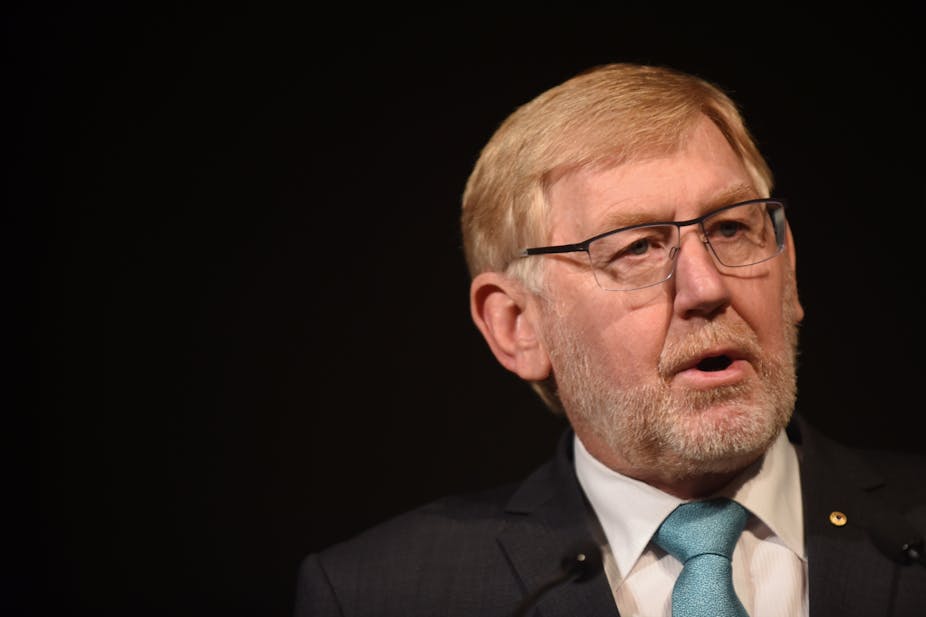Bill Shorten should resist the witch-hunt against former ALP minister Martin Ferguson over his attacks on NSW Labor’s anti-privatisation campaign.
The idea that the Labor Party should expel Ferguson – which is now to be considered – is dumb.
Many Labor members, and particularly union members, are deeply angry with the one-time resources minister, after the NSW Liberals ran an advertisement with a clip of him saying state Labor was telling a “bald lie” about electricity privatisation.
On election night there was an extraordinary outburst from senator Sam Dastyari, a former general secretary of the NSW branch, who accused Ferguson of “a bastard act”, declaring “there is no place in the Labor party for Martin Ferguson”.
Questioned about his attitude to the push to expel Ferguson, Shorten on Tuesday had a bob each-way. “On the one hand the Labor Party is a broad church and individuals periodically contradict the policy or they even publicly have a disagreement, which you wish they wouldn’t, but that happens,” Shorten said.
“But on the other hand, if there’s been an element of working with the Liberal Party to damage Labor’s chances, that’s in a different category of action altogether. I expect the Labor administration to investigate this matter fully.”
The clip in the ad came from an interview that Ferguson, who is chairman of the Australian Petroleum Production and Exploration Association advisory board, did with Keith Orchison, editor of the On Power website, which deals with energy issues.
Orchison, a former chief executive of two national energy associations, has since said that Ferguson “didn’t connive with the Liberal Party to provide the now notorious film clip”.
“Ferguson was actually in London on business when Premier Mike Baird’s office approached me for access to the film clip and I gave it.” Orchison said he regarded the material, which was on the On Power site, as in the public domain.
Ferguson these days would be considered closer to the Liberals than to Labor on a number of issues, including industrial relations.
But Ferguson insists he did not co-operate with the Liberal party or give it permission to use the clip. “Both sides lift what suits them” for election ads, he says.
The formal action against Ferguson – a member of the Victorian branch of the ALP – has come from the Victorian secretary of the Maritime Union of Australia (MUA), Kevin Bracken, who successfully moved a motion at the Victorian Trades Hall Council calling for Labor to expel him.
Bracken has a controversial past, claiming the September 11, 2001, attacks were a conspiracy, with elements of the then-Bush administration, military personnel and security services involved.
The move against Ferguson will be considered by the Victorian Labor Party’s disputes tribunal, from which there is an appeals process to a national appeals tribunal. He says he intends to fight the charges brought against him.
Ferguson’s tangled with the MUA before. Last year, he was the target of its Western Australian branch after he said the union’s wage claims and work practices had contributed to a budget blowout and delays in the West Australian Gorgon gas project.
MUA WA secretary Chris Cain described him as a “traitor to working-class people”. Ferguson was accused of breaching the ministerial code by taking a post with APPEA earlier than the code permitted. The WA ALP executive endorsed a MUA motion calling for his expulsion. This went to the ALP national executive, which took no further action.
While the use of the Ferguson clip in the campaign ad was a major embarrassment for NSW Labor, other high-profile ALP figures had made similar points. In November, Paul Keating, when appearing with Mike Baird, supported the premier’s stand on power privatisation saying “there are still some obscurantists in the Labor Party”.
Ferguson argues his comments are consistent with what he said in government. “The record will show the [Queensland] Bligh and [NSW] Iemma governments sought to privatise electricity assets and the Labor government in Canberra supported those governments.”
Iemma is one of the strong defenders of Ferguson in the present controversy, saying it would be vindictive and petty to expel him. “He was expressing an opinion that he has held for a decade or more,” the former premier said.
Although the feeling against Ferguson is strong in the NSW party, if the move against him succeeded it would feed into the narrative of the unions calling the tune in Labor, when the unions’ power in its structure is an issue for the party.
It would go against the notion of a pluralist party, highlight that the ALP is conflicted about privatisation, and fuel a perception of Labor infighting. None of that would be to Shorten’s advantage.

